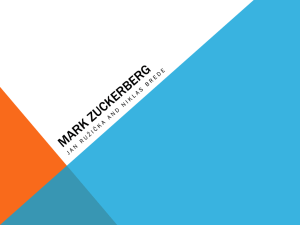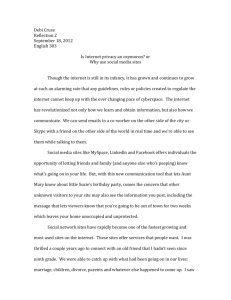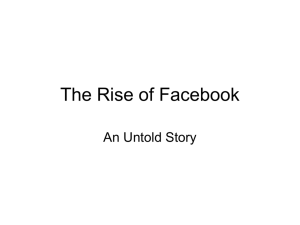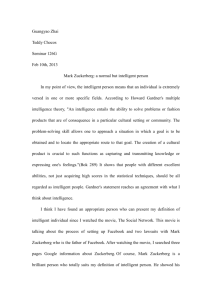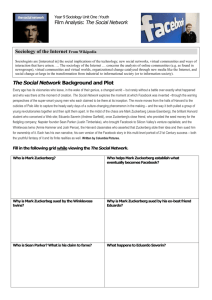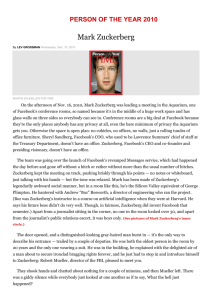Mark Zuckerberg
advertisement
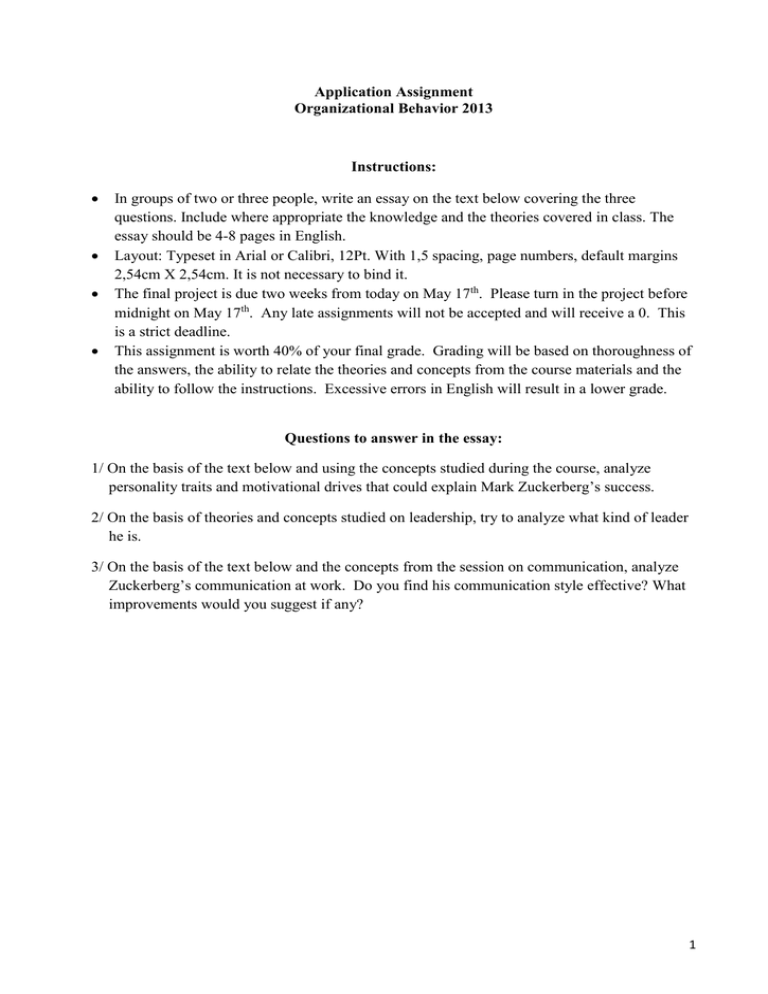
Application Assignment Organizational Behavior 2013 Instructions: In groups of two or three people, write an essay on the text below covering the three questions. Include where appropriate the knowledge and the theories covered in class. The essay should be 4-8 pages in English. Layout: Typeset in Arial or Calibri, 12Pt. With 1,5 spacing, page numbers, default margins 2,54cm X 2,54cm. It is not necessary to bind it. The final project is due two weeks from today on May 17th. Please turn in the project before midnight on May 17th. Any late assignments will not be accepted and will receive a 0. This is a strict deadline. This assignment is worth 40% of your final grade. Grading will be based on thoroughness of the answers, the ability to relate the theories and concepts from the course materials and the ability to follow the instructions. Excessive errors in English will result in a lower grade. Questions to answer in the essay: 1/ On the basis of the text below and using the concepts studied during the course, analyze personality traits and motivational drives that could explain Mark Zuckerberg’s success. 2/ On the basis of theories and concepts studied on leadership, try to analyze what kind of leader he is. 3/ On the basis of the text below and the concepts from the session on communication, analyze Zuckerberg’s communication at work. Do you find his communication style effective? What improvements would you suggest if any? 1 _____________________________________________________________________________ Mark Zuckerberg Adapted from Time, Dec. 15, 2010, by Lev Grossman On the afternoon of Nov. 16, 2010, Mark Zuckerberg was leading a meeting in the Aquarium, one of Facebook's conference rooms. Conference rooms are a big deal at Facebook because they're the only places anybody has any privacy at all. Otherwise the space is open plan: no cubicles, no offices, no walls, just a rolling tundra of office furniture. Even Zuckerberg, Facebook's CEO and co-founder and presiding visionary, doesn't have an office. The team was going over the launch of Facebook's revamped Messages service: Zuckerberg kept the meeting on track, pushing briskly through his points — no notes or whiteboard, just talking with his hands — but the tone was relaxed. Much has been made of Zuckerberg's legendarily awkward social manner, but in a room like this, he's the Silicon Valley equivalent of George Plimpton (1). Almost seven years ago, in February 2004, when Zuckerberg was a 19-year-old sophomore at Harvard, he started a Web service from his dorm. It was called Thefacebook.com, and it was billed as "an online directory that connects people through social networks at colleges." On Oct. 4th 2012, Facebook added its first billionth member. One out of every seven people on the planet has a Facebook account. They speak 75 languages. In less than seven years, Zuckerberg wired together a seventh of humanity into a single network. If Facebook were a country it would be the third largest, behind only China and close to India. It started out as a lark, a diversion, but it has turned into something real, something that has changed the way human beings relate to one another on a species-wide scale. We are now running our social lives through a for-profit network that has made Zuckerberg a billionaire many times over. We have entered the Facebook age, and Mark Zuckerberg is the man who brought us here. 2 Zuckerberg was born in 1984 and grew up in Dobbs Ferry, N.Y., the son of a dentist. He has three sisters, the eldest of whom, Randi, is now Facebook's head of consumer marketing and social-good initiatives. It was a supportive household that produced confident children. The young Mark was "strong-willed and relentless," according to his father Ed. "For some kids, their questions could be answered with a simple yes or no," he says. "For Mark, if he asked for something, yes by itself would work, but no required much more. If you were going to say no to him, you had better be prepared with a strong argument backed by facts, experiences, logic, reasons. We envisioned him becoming a lawyer one day, with a near 100% success rate of convincing juries." The Zuckerberg children were much given to pranks (2); they were also great undertakers of projects. One year, over winter vacation, they decided to film a complete Star Wars parody called The Star Wars Sill-ogy. "We took our job very seriously," Randi says. "Every morning we'd wake up and have production meetings." Mark had a Star Wars–themed bar mitzvah and was a precocious computer programmer. When he was 12, he created a network for the family home that he called ZuckNet; this was at a time when home networks didn't come in a box. He also wrote computer games: a version of Monopoly set at his middle school and a version of Risk based on the Roman Empire. Zuckerberg went to a local high school and then to Phillips Exeter Academy in New Hampshire, where he showed an aptitude for two incongruously old-fashioned pursuits: ancient languages and fencing. He also co-wrote with a classmate a music-recommendation program called Synapse that both AOL and Microsoft tried to buy for around a million dollars. But Zuckerberg would have had to drop out of school to develop it. He decided to go to Harvard instead. Zuckerberg's life at Harvard and afterward was the subject of a movie released in October called The Social Network. The Social Network is a rich, dramatic portrait of a furious, socially handicapped genius who spits corrosive monologues in a monotone to hide his inner pain. This character bears almost no resemblance to the actual Mark Zuckerberg. The reality is much more complicated. He's not a physically imposing presence and is always dressed like a frat boy (3), in T-shirts and jeans. His most notable physical feature is his chin, which he holds at a slightly elevated angle. In the movie, this played as him looking down his nose at you, but in real life it's more like he's standing on his tiptoes, trying to see over something. Holding a conversation with him can be challenging. In conversations he is formidably quick and talks rapidly and precisely, and if he has no data to transmit, he abruptly falls silent. ("I usually don't like things that are too much about me" was how he began our first interview.). Most alarmingly, if you're not making compelling points, Zuckerberg will turn his head and look off to one side, presenting you with his Roman-emperor profile. As if he's going to find a better use of his time, even if you're sitting right there. 3 In spite of all that, Zuckerberg is a warm presence, not a cold one. He has a quick smile and doesn't shy away from eye contact. He thinks fast and talks fast, but he wants you to keep up. He exudes not anger or social anxiety but a weird calm. When you talk to his co-workers, they're so adamant in their avowals of affection for him and in their insistence that you not misconstrue his oddness that you get the impression it's not just because they want to keep their jobs. People really like him. The Zuckerberg of the movie is a simple creature of clear motivations: he uses his outsize gifts as a programmer to acquire girls, money and party invitations. This is a fiction. In reality, Zuckerberg already had the girl: Priscilla Chan, who is now a third-year med student at University of California, San Francisco. They met at Harvard seven years ago, before he started Facebook. Now they live together in Palo Alto. When The Social Network came out, Zuckerberg rented out a bunch of movie theaters and took the whole company to see it. “The biggest thing that thematically they missed (…) is the actual motivation for what we're doing, which is, we think it's an awesome thing to do." As for money, his indifference to it is almost pathological. His lifestyle is modest by most standards but monastic for someone whose personal fortune was estimated by Forbes at $6.9 billion. Zuckerberg lives near his office in a house that he rents. He works constantly; his only current hobby is studying Chinese. For Thanksgiving break, he took his family to the Wizarding World of Harry Potter in Orlando. He bought a wand at Ollivander's. One of the interests Zuckerberg lists on his Facebook page is "Eliminating Desire." "I just want to focus on what we're doing," Zuckerberg says, I think it would be very easy to get distracted and get caught up in short-term things or material things that don't matter. The phrase is actually 'Eliminating desire for all that doesn't really matter.' “ This would all be so much dorm-room philosophizing if it weren't for the fact that Zuckerberg is a billionaire and also for the fact that he appears to be making good on it. On Dec. 9, as part of a campaign organized by Bill Gates and Warren Buffett, he pledged to give away at least half his wealth over the course of his lifetime. The reality is that Zuckerberg isn't alienated, and he isn't a loner. He's the opposite. He's spent his whole life in tight, supportive, intensely connected social environments: first in the bosom of the Zuckerberg family, then in the dorms at Harvard and now at Facebook, where his best friends are his staff, there are no offices and work is awesome. Zuckerberg loves being around people. He didn't build Facebook so he could have a social life like the rest of us. He built it because he wanted the rest of us to have his. Zuckerberg fired the first shot in his generation's takeover of the Internet. He has no sentimental feelings about equality and anonymity: he just wanted people to be themselves. On earlier social networks like Friendster and Myspace, identity was malleable and playful, but Facebook was and is different. "We're trying to map out what exists in the world," he says. "In the world, there's trust. I think as humans we fundamentally parse the world through the people and relationships we have around us. So at its core, what we're trying to do is map out all of those trust 4 relationships, which you can call, colloquially, most of the time, friendships." He calls this map the social graph. Facebook didn't stay on campus. Zuckerberg and his partners led Facebook on a Risk-style forced-march campaign to conquer the world. It grew because it gave people something they wanted. A cyberspace more like the real world: dull with all the trappings of ordinary bourgeois existence, but civilized On Facebook you are who you are. The fact that people yearned not to be liberated from their daily lives but to be more deeply embedded in them is an extraordinary insight, as basic and era-defining in its way as Jobs' realization that people prefer a graphical desktop to a command line or pretty computers to boring beige ones. This is another area in which the angry-robot theory of Mark Zuckerberg doesn't really pan out: he understands a remarkable amount about other people. Sometimes it seems like the understanding of an alien anthropologist studying earthlings, but it's real. "In college I was a psychology major at the same time as being a computer-science major," he says. "I say that fairly frequently, and people can't understand it.” There are other people who can write code as well as Zuckerberg — not many, but some — but none of them get the human psyche the way he does. "He has great EQ," says Naomi Gleit, Facebook's product manager for growth and internationalization. "I'll often ask him for advice about, like, a girl issue that I'm dealing with. And he'll very rationally give me his opinion on the situation." His mother Karen, a psychiatrist who left the profession to manage her husband's office, attributes what she calls Mark's "sensitivity" to the fact that he was raised with three sisters. Wherever it comes from, this acute awareness of how other people's brains work characterizes all of Zuckerberg's projects, even the projects he did before Facebook: they hooked people. Whereas earlier entrepreneurs looked at the Internet and saw a network of computers, Zuckerberg saw a network of people. This is not a thunderously radical vision, but it's turning out to be an incredibly powerful one. Consider: in 2005 one of the most competitive markets on the Internet was photo sharing, and Facebook brought a knife to a gunfight. "It was possibly the least functional photos product on the Internet," says Bret Taylor, Facebook's chief technology officer, but Facebook had only one thing the others didn't: people. If you put up a photo of somebody, you could tag that photo with his or her name.” Facebook launched its crappy photo-sharing service in late October 2005. Now Facebook uploads 3,000 pictures every second or more than 250 million every day. What Zuckerberg is doing is fundamentally changing the way the Internet works and, more importantly, the way it feels. "It's a shift from the wisdom of crowds to the wisdom of friends," says Sandberg. "It doesn't matter if 100,000 people like x. If the three people closest to you like y, you want to see y." The Internet, and the whole world, will feel more like a family, or a college dorm, or an office where your co-workers are also your best friends. 5 Facebook occupies two Palo Alto office buildings that are a few minutes apart. On the outside, they're brutalist concrete bunkers. On the inside, they're decorated in a quirky, postindustrial Silicon Valley style you might call Flourishing Start-Up Chic — high ceilings, concrete floors, steel beams, lots of windows. There's a giant chessboard, and the word hack has been doodled and graffitied everywhere. The halls are littered with RipStiks, those two-wheeled skateboards that you move by wiggling, which Zuckerberg doesn't ride. Silicon Valley companies squabble incessantly and viciously over personnel. Employees change hands like poker chips, and right now Facebook has the best hand at the table. Everyone at Facebook was a star somewhere else: Taylor, for example, led the team that created — maybe you've heard of it? — Google Maps. You don't get a lot of shy, retiring types at Facebook. These are the kinds of power nerds to whom the movies don't do justice: fast-talking, user-friendly, laser-focused and radiating the kind of confidence that gives you a sunburn. Facebook employees get treated well — three free, good meals a day; unlimited snacks; free dry cleaning — but make no mistake: the main attraction is Zuckerberg's vision. All the key engineers tell the same conversion story. "I was like, I'm not interested. I'm working on a serious problem. Facebook is a complete waste of time," says Chris Cox, Facebook's vice president of product, who was doing a master's in artificial intelligence at Stanford at the time. "And the interview completely changed my mind. I saw the vision. I came in, and I saw it on a whiteboard." Facebook has a dual identity, as both a for-profit business and a medium for our personal lives, and those two identities don't always sit comfortably side by side. Looked at one way, when a friend likes a product, it's just more sharing, more data changing hands. Looked at another way, it's your personal relationships being monetized by a third party. There's a school of thought that goes something like, Mark Zuckerberg is a scheming profiteer who uses his control of Facebook to force people to share more and more of their personal lives publicly, sucking up their innermost thoughts like some kind of privacy vampire so he can feed their data to advertisers and increase traffic to his network, thereby adding to his massive personal fortune. It is true Facebook has been regularly embroiled in privacy rows. Fear is that it will allow companies to trawl through its users looking for email addresses and phone numbers so it can better target adverts. Despite its claims that there are safeguards attached to these measures, Zuckerberg may have a blind spot when it comes to personal privacy, which is why that issue keeps coming up. Zuckerberg has a talent for understanding how people work, but one urge, the urge to conceal, seems to be foreign to him. Sometimes Facebook makes it harder than it should be. It is biased in favor of sharing. That is, after all, what Facebook is for. "The thing that I really care about is making the world more open and connected," Zuckerberg says. "What that stands for is something that I have believed in for a really long time." Pressed to define it, Zuckerberg gamely expands. "Open means having access to more information, right? More transparency, being able to share things and have a voice in the world. And connected is helping people stay in touch and maintain empathy for each other, and bandwidth." 6 “People are very sensitive about privacy, and I think they're right to be," Zuckerberg says. "But we still just come to work every day and make the decisions that we think are best for the product”: the Internet was built to move information around, not keep it in one place, and it tends to do what it was built to do. When it comes to privacy, it's entirely possible that Zuckerberg will turn out not to be wrong, just prescient. Social norms change. People hated Facebook's News Feed when it was introduced in 2006. They thought it was creepy and intrusive. Zuckerberg stood his ground, and now Facebook is unimaginable without it. He moved the chains, and we went with him, setting up our defense that much farther toward the end zone. All technologies come with trade-offs, but for now Zuckerberg just doesn't seem that interested in the other side of the trade, the downside. There are some eloquent, persuasive critiques of life on Facebook out there, but they don't fuss him, particularly. "They're just looking at it through a completely different lens," he says. "And I appreciate that. Because it would be impossible for me to dissociate myself to that extent, to get that perspective. I mean, people write all kinds of different things, from 'It's the greatest thing that's ever existed' to 'It's the worst thing that's ever existed.' " Zuckerberg tries to put himself in the heads of people who don't have his weapons-grade mental hardware, his immunity to peer pressure, his absolute mastery of his privacy settings and his gift for inspiring loyalty. In other words, most of the people who use Facebook. But it's a stretch. His EQ has its limits. He'll play at fallibility — "Almost any mistake you can make in running a company, I've probably made," he says. But this is a guy so sure of himself that he walked away from a million-dollar payday when he was barely out of high school, who turned down a billiondollar offer for Facebook from Yahoo! when he was 22 and whose self-control is so total that he drives an Acura when he could afford a Bentley. No wonder he doesn't see how challenging Facebook can be for the rest of us. He's his own perfect customer. "The craziest thing to me in all this," he says, "is that I remember having these conversations with my friends when I was in college. We would just sort of take it as an assumption that the world would get to the state where it is now. But, we figured, we're just college kids. Why were we the people who were most qualified to do that? I mean, that's crazy!" (1) : George Plimpton (1927 – 2003) was a very famous American journalist, writer, editor, actor, and gamesman. He is widely known for his sports writing and for helping to found The Paris Review (2) “Pranks”: funny tricks and jokes (3) “frat boy” : college student 7
